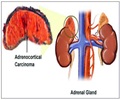Suppression of testosterone levels in men with testicular cancer may inadvertently increase the risk of Alzheimer’s disease, warn US researchers. A research team from North Carolina University has found that when circulating testosterone levels go down, a high rise in levels of amyloid – the protein implicated in Alzheimer’s disease – occurs. They suggest that this phenomenon might explain why Alzheimer’s develops later in life and that hormonal treatments for testicular cancer, which suppress testosterone levels, could potentially predispose individuals to this form of dementia.
In their study Dr Sam Chater and colleagues noted that all six men with testicular cancer who were treated by hormonal supression experienced an increase in plasma amyloid levels. Plasma amyloid roughly doubled over the six months of the investigation, say the researchers.Previous animal research by the team had shown that brain concentrations of amyloid increased significantly in female guinea pigs whose ovaries had been removed. Once hormone replacement therapy had been administered, the brain amyloid levels decreased.
Dr Chater said that people with a genetic predisposition to Alzheimer’s disease might have borderline amyloid levels until menopause, or the male equivalent andropause, reduces gonadal hormone secretion. “Brain amyloid levels may then rise enough to cause amyloid accumulation to begin,” he said.
A 8-year study is currently underway to investigate whether hormone replacement therapy can prevent the disease, with five-year interim results due in 2002. “If hormones are proven to be effective in this trial, then prevention of Alzheimer’s disease may become an indication for hormone replacement therapy in both men and women,” said Dr Sam.










